Rights Group Urges UN To Stop Iran From Concealing Graves Of 1988 Victims
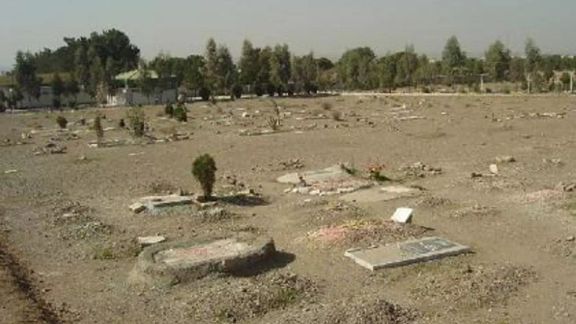
Amnesty International called on UN Human Rights Council Tuesday to make Iranian authorities stop concealing the mass graves of victims of the 1988 “prison massacres.”

Amnesty International called on UN Human Rights Council Tuesday to make Iranian authorities stop concealing the mass graves of victims of the 1988 “prison massacres.”
The group also urged an international investigation into the extrajudicial execution and enforced disappearance of thousands of dissidents, which according to the group amount to ongoing crimes against humanity.
In recent months, Iranian authorities have erected new high concrete walls around the Khavaran cemetery outside the capital Tehran, where the remains of several hundred political dissidents executed in secret in 1988 are buried.
The construction has sparked serious concerns that the authorities would destroy or tamper with the mass grave site away from public view as the site is no longer visible from the outside and its entrance is guarded.
“The Iranian authorities cannot simply build a wall around a crime scene and think that all their crimes will be erased and forgotten. For 34 years, the authorities have systematically and deliberately concealed and destroyed key evidence that could be used to establish the truth about the scale of the extrajudicial executions carried out in 1988,” said Diana Eltahawy, a deputy director at Amnesty International. “This abomination must end once and for all, and the UN Human Rights Council must urgently establish an independent investigative mechanism to uncover the truth.”
Around 4,000 prisoners are believed to have been killed. Most victims were members or supporters of the exiled Mujahedin-e Khalq Organization (MEK) as well as Marxists and other members of other leftists groups.
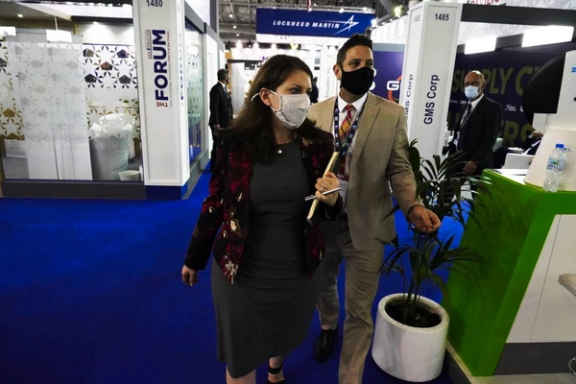
A White House official says the US seeks to be involved in joint regional missile defense against Iran to make sure Israel can continue to defend itself.
US Deputy Assistant Secretary for Regional Security Mira Resnick said at The Jerusalem Post Annual Conference in New York on Monday that “We will make sure Israel can continue to defend itself and respond to the many threats that surround it,” she added, highlighting Iran’s “very destabilizing role in the region” as a reason for Washington’s support for the defense efforts.
When it comes to Israel’s defense, she said, “the US is absolutely supportive of Israel,” citing the $3.8 billion in defense aid Israel provides annually, in addition to the $1 billion to revamp the Iron Dome missile defense system last year.
She added that such partnerships need to expand into other areas in order to be sustainable, mentioning ties in trade, sports and other areas as some examples. “This is something the US wants to foster. There’s no silver bullet to this challenge and we’ll need to work together,” she said.
In June, the US Senate and House Abraham Accords Caucus unveiled a bipartisan, bicameral effort to create a united front against the Iranian aggression in the Middle East, something that has been worrying the Islamic Republic ever since.
The legislation proposes that the Pentagon work with Israel to integrate air defenses of six GCC countries of Bahrain, Kuwait, Oman, Qatar, Saudi Arabia, and the United Arab Emirates with Egypt, Jordan, and Iraq with the aim of thwarting threats from Iran and Iranian backed-militias across the region.
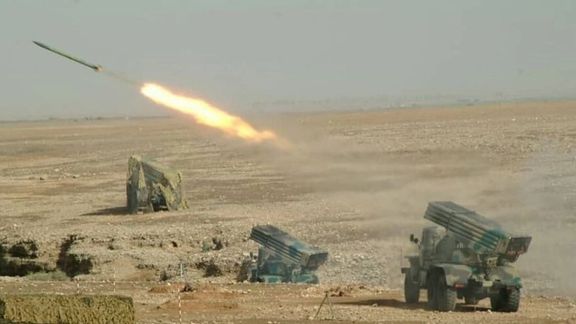
Iran has reacted to military clashes between neighbors Armenia and Azerbaijan, reiterating that it would not accept any border changes between the two countries.
Foreign ministry spokesman Nasser Kanaani was quoted by the official government news website IRNA as saying that Tehran was following “this issue carefully” and offered Iran’s help to resolve differences.
Armenia said on Tuesday that at least 49 of its soldiers had been killed in clashes along the border with Azerbaijan after a sharp escalation in hostilities which prompted Russia and the United States to call for restraint.
The escalation of decades-old hostilities between the south Caucasus countries has fuelled fears that a second fully-fledged war could break out in the post-Soviet world in addition to Russia's invasion of Ukraine.
Iran has to an extent supported Armenia in the conflict with Azerbaijan and has warned that it would not allow any seizure of territory from Armenia proper by Baku. Tehran in the past has also expressed alarm at alleged Israeli military presence in Azerbaijan. Foreign Minister Hossein Amir-Abdollahian also warned in October 2021 that Iran will not tolerate "geopolitical change" in the region and at the borders.
Armenia said Tuesday that several towns near the border with Azerbaijan, including Jermuk, Goris and Kapan, were being shelled in the early hours of Tuesday, and that it had responded to what it called a "large-scale provocation" by Azerbaijan.
Baku said it was attacked by Armenia.
Armenian Prime Minister Nikol Pashinyan accused Azerbaijan of attacking Armenian towns because it did not want to negotiate over the status of Nagorno-Karabakh, an enclave which is inside Azerbaijan but mainly populated by ethnic Armenians.
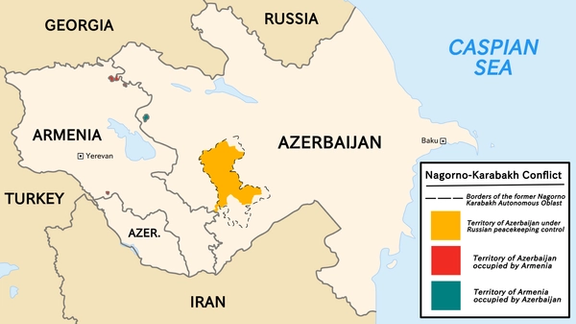
"The intensity of hostilities has decreased but attacks on one or two fronts from Azerbaijan continue," Pashinyan said in a speech to parliament, according to Russian media.
Azerbaijan, which accused Armenia of carrying out intelligence activity along the border and moving weapons, said its military positions came under attack by Armenia. Azeri media reported that a ceasefire agreement had been broken almost immediately after being enforced early on Tuesday.
‘No military solution’
Both Russia and the United States called on Baku and Yerevan to observe restraint.
"As we have long made clear, there can be no military solution to the conflict," US Secretary of State Antony Blinken said in a statement. "We urge an end to any military hostilities immediately."
The Russian foreign ministry said in a statement that the conflict between Armenia and Azerbaijan "should be resolved exclusively through political and diplomatic means".
Russia, which operates a military base in Armenia, sent thousands of peacekeepers to the region in 2020 as part of a deal to end six weeks of hostilities during which Azerbaijan make significant territorial gains in and around Nagorno-Karabakh.
Moscow is a key power broker in the region and an ally of Yerevan through the Moscow-led Collective Security Treaty Organization (CSTO), which convened on Tuesday to discuss the situation. Turkey backs Azerbaijan.
The defense ministers of Armenia and Russia spoke on Tuesday morning and agreed to take steps to stabilise the situation on the border. Turkish Foreign Minister Mevlut Cavusoglu talked to his Azeri counterpart Jeyhun Bayramov and called for Armenia to "cease its provocations".
Charles Michel, president of the European Council, also urged Pashinyan to prevent further escalation. Michel met with Pashinyan and Azerbaijaini President Ilham Aliyev last month in Brussels.
With reporting by Reuters
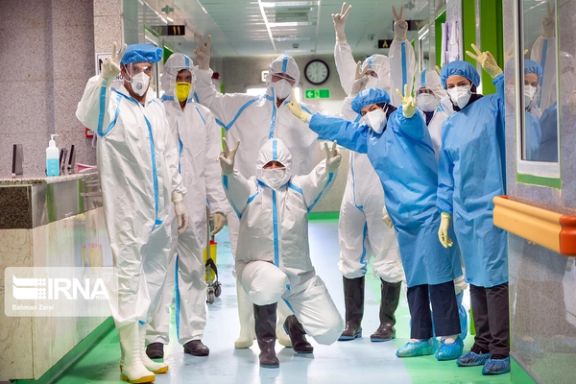
As Iranian doctors are emigrating to other countries in droves, the health ministry has increased the exit permit bond for medical, dental and pharmacy students to $5,000 per year.
Deputy minister for education at the health ministry, Abolfazl Bagherifard, said on Monday that students in graduate levels should provide 1.5 billion rials ($5,000) to leave the country for a year and undergraduate levels should provide bonds worth $2,000.
Students must provide an official letter of commitment to return as well as another person's guarantee by depositing a real estate bond or a bank guarantee.
Officials and lawmakers are warning that Iran may be forced to hire foreign doctors as Iranian physicians are leaving in high numbers. Dr Mohammad Raeeszadeh, the head of Medical Council of the Islamic Republic of Iran, recently warned that wrong government policies is causing disillusionment among young medical practitioners and could lead to a wave of emigration or change of career among them.
Earlier in the year in April, Iran's Medical Council said about 4,000 doctors have applied for Certificates of Good Standing in the past 12 months with the intent to leave the country. Council spokesman Reza Laripour said that the annual number of such applications was less than 600 between 2013 and 2015.
An opinion survey conducted in August indicated that almost half of Iranian youth want to leave the country amid pessimism about their future.

Israeli Defense Minister Benny Gantz said Monday that Iran has used more than 10 military sites in Syria to produce advanced missiles and weapons for its proxies.
Israel has been mounting air and missile attacks since 2017 on what it has described as Iranian-linked targets in Syria, but these have largely been weapons shipments and warehouses.
There were no immediate comments from Iran and Syria on Monday, but Damascus has declined to comment on such accusations in the past and Tehran has denied it builds production capabilities across the Middle East.
But top Iranian military officials routinely threaten Israel with attacks by their proxy forces in Syria and Lebanon and even direct strikes.
Ground forces chief Brigadier General Kyumars Haydaritold the semi-officila hardline Mehr news website on Monday that Iran has developed an advanced long-range suicide drone "designed to hit Israel's Tel Aviv, Haifa.” He said the drone, named Arash-2, is a newer version of Arash-1.
Speaking at a conference in New York, Gantz presented a map of what he said were military sites of the Centre D'Etudes et de Recherches Scientifiques (CERS), a Syrian government agency, involved in manufacturing missiles and weapons for Iran.
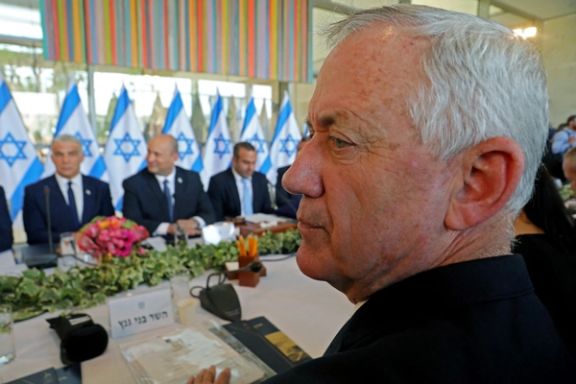
"Iran transformed CERS into production facilities for mid and long-range, precise missiles and weapons, provided to Hezbollah and Iranian proxies. In other words, it became yet another Iranian front – a factory for advanced, strategic weapons," Gantz said.
Israel is fiercely campaigning against a new nuclear deal with Iran that the United States and three of its European allies, Britain, France and Germany have been negotiating since April 2021. Both former Prime Minister Benjamin Netanyahu and the current leadership argue that the new deal will not permanently stop Iran from developing nuclear weapons but will lift US sanctions and release hundreds of billions of dollars, which would worsen Iran’s missile and terror threats in the region.
Strikes attributed to Israel have recently intensified on Syrian airports to disrupt Tehran's increasing use of aerial supply lines to deliver arms to allies in Syria and Lebanon, including Hezbollah, regional diplomatic and intelligence sources have told Reuters.
Israeli strikes have repeatedly targeted the Masyaf area, a zone in the western Hama district where Gantz said an underground weapons production facility threatens Israel and the region.
"Masyaf, specifically, is used to produce advanced missiles," he said.
Gantz added that Iran was also working on building missile and weapons industries in Lebanon and Yemen. The Lebanese Hezbollah already possesses precision an arsenal of precision missiles and Israeli officials are warning of its intentions to target the country if a conflict breaks out.
"If this trend will not be stopped, within a decade, there will be advanced Iranian industries across the region, producing weapons and spreading terror," he said.
With reporting by Reuters
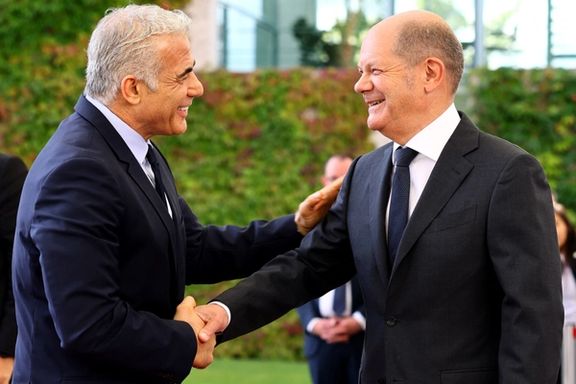
Israeli Prime Minister Yair Lapid, who is on a state visit to Germany, reiterated Monday that the revival of the 2015 nuclear deal with Iran would be a "crucial mistake."
During a joint press conference in Berlin with German Chancellor Olaf Scholz, Lapid said he provided the chancellor with sensitive intelligence information that supports Israel's opposition to the looming agreement.
Stressing the need for a new strategy to stop Iran's nuclear program, he said, "Removing sanctions and pouring hundreds of billions of dollars into Iran will bring waves of terrorism, not only to the Middle East, but also across Europe." He added, “A nuclear Iran will destabilize the Middle East, and create a nuclear arms race that will endanger the entire world.”
Lapid welcomed the statement released by Germany, Britain and France who said September 10, that they had "serious doubts" about Tehran's intentions to reach a nuclear deal.
Scholz, for his part, said the Islamic Republic must not be allowed to obtain nuclear weapons. He said Germany and the other European powers had made suggestions that Iran had refused, expressing regret that Tehran has not positively responded to the proposals.
Despite Israel’s strong opposition to a new agreement, Scholtz renewed calls for a diplomatic solution to the Iran nuclear crisis, saying that “a functional international agreement to limit Iran’s nuclear program is the right way.”